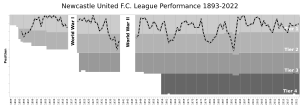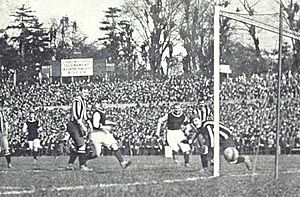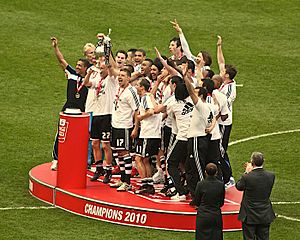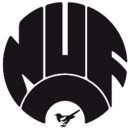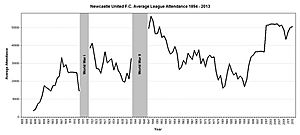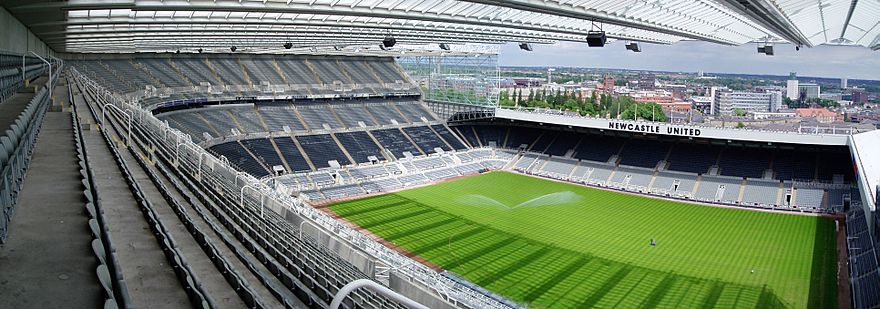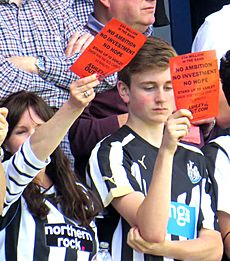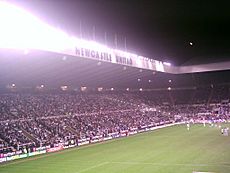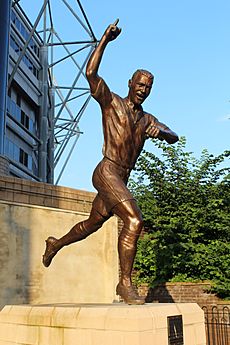Newcastle United F.C. facts for kids
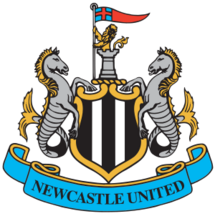 |
|||
| Full name | Newcastle United Football Club | ||
|---|---|---|---|
| Nickname(s) |
|
||
| Founded | 1881 (as Stanley F.C.) 1882 (as East End F.C.) 1892 (as Newcastle United F.C.) |
||
| Ground | St James' Park | ||
| Capacity | 52,305 | ||
| Owners |
|
||
| Chairman | Yasir Al-Rumayyan | ||
| Head coach | Eddie Howe | ||
| League | Premier League | ||
| 2018–19 | Premier League, 13th of 20 | ||
|
|||
Newcastle United Football Club is a professional football team from Newcastle upon Tyne, England. They play in the Premier League, which is the top football league in England. The club started in 1881 and has always played its home games at St James' Park. This stadium is right in the middle of Newcastle and can hold over 52,000 fans.
Newcastle United has been in the Premier League for most of its history. They have spent 93 seasons in the top division and have never dropped below the second-highest league since 1893. The club has won many trophies, including four League titles, six FA Cups, one EFL Cup, and an FA Charity Shield. They also won the Inter-Cities Fairs Cup. Their most successful time was between 1904 and 1910, when they won three League titles and an FA Cup.
More recently, Newcastle was second in the League or FA Cup four times in the 1990s. They were moved down to a lower league in 2009 and again in 2016. However, they quickly won promotion back to the Premier League both times, winning the EFL Championship in 2010 and 2017. In October 2021, a new group of owners, led by the Public Investment Fund from Saudi Arabia, took over the club. In 2025, Newcastle won the 2024–25 EFL Cup, which was their first major trophy in almost 56 years.
Newcastle's famous home kit has black-and-white striped shirts, black shorts, and black or white socks. Their club badge has parts of the city's coat of arms, including two grey sea horses. Before every home game, the team walks onto the field while the song "Going Home" plays. Fans also sing "Blaydon Races" during matches.
Contents
- Club History: A Journey Through Time
- Club Identity: Colours and Crest
- St James' Park: Newcastle's Home Ground
- Club Ownership: Who Runs the Team?
- Social Responsibility: Helping the Community
- Supporters and Rivalries: The Toon Army
- Records and Statistics: Club Achievements
- Players: The Team Today
- Management and Leadership
- Honours: Trophies Won
- See also
Club History: A Journey Through Time
How Newcastle United Started (1881–1903)
Football was first played in the Newcastle area in 1877. Newcastle United's story began in November 1881, when a team called Stanley Cricket Club formed a football club. This team soon changed its name to Newcastle East End F.C. in 1882. Another local team, Newcastle West End F.C., also formed around the same time.
Newcastle West End played at St James' Park. But in 1892, Newcastle West End had money problems and closed down. Many of its players and staff joined Newcastle East End, which then took over the lease for St James' Park. With only one main club in the city, football grew very quickly.
To attract more fans, Newcastle East End decided to change its name. On December 9, 1892, they chose "Newcastle United" to show that the two teams had come together. The club officially became Newcastle United Football Club Co. Ltd. in 1895. In the 1893–94 season, Newcastle United joined the Football League's Second Division. They played their first game in this division against Woolwich Arsenal, ending in a 2–2 draw.
At first, not many people came to watch the games. But by 1895–96, crowds grew, with 14,000 fans watching a game against Bury. Thanks to Frank Watt, who became the club's secretary, Newcastle was promoted to the First Division for the 1898–99 season.
Early Success and War Years (1903–1937)
From 1903–04, Newcastle United became a very strong team. They were known for their "artistic play" and quick, short passes. They won the League title three times in the 1900s: in 1904–05, 1906–07, and 1908–09. In 1905, they almost won both the League and the FA Cup, but lost in the FA Cup Final to Aston Villa. They reached the FA Cup Final again in 1906 and 1908 but lost both times.
Finally, in 1910, Newcastle won the FA Cup by beating Barnsley. They reached the final again in 1911 but lost to Bradford City.
The team returned to the 1924 FA Cup Final at the new Wembley Stadium, where they beat Aston Villa to win their second FA Cup. Three years later, in 1926–27, they won the First Division championship for the fourth time. Hughie Gallacher, one of the club's best goal scorers, was the captain.
In 1930, the team almost dropped to a lower league. Hughie Gallacher left, and Andy Cunningham became the first team manager. In 1931–32, the club won the FA Cup for a third time. However, in 1933–34, after 35 seasons in the top league, Newcastle was moved down to the Second Division.
Post-War Triumphs (1937–1969)
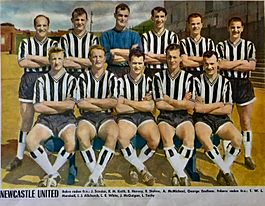
After World War II, Newcastle got stronger. They brought in great players like Jackie Milburn. They were promoted back to the First Division in 1947–48. In the 1950s, Newcastle won the FA Cup three times in five years: in 1951 against Blackpool, in 1952 against Arsenal, and in 1955 against Manchester City.
After these wins, the club declined again and was moved down to the Second Division in 1960–61. Former player Joe Harvey became manager, and Newcastle returned to the First Division in 1964–65 by winning the Second Division title. Under Harvey, the club played in a European competition for the first time. The next year, they won the 1969 Inter-Cities Fairs Cup Final, beating Újpest from Hungary 6–2 over two games.
Moving Between Leagues (1969–1992)
In 1971, Harvey bought striker Malcolm Macdonald for a club record fee. Macdonald was a fantastic goal scorer. He led the team to the 1974 FA Cup Final, where they lost to Liverpool. Newcastle also won the Texaco Cup twice in 1974 and 1975.
After Harvey left in 1975, Gordon Lee became manager. Lee took the team to the 1976 Football League Cup Final but they lost. He then sold Macdonald, which Macdonald later said he was sad about. Newcastle was moved down to the Second Division again in 1977–78.
Managers like Arthur Cox helped Newcastle get back to the First Division in 1983–84. Key players at this time included Peter Beardsley, Chris Waddle, and former England captain Kevin Keegan. However, due to a lack of money, these players were sold, and the team was moved down again in 1988–89.
In 1992, John Hall became chairman and brought Kevin Keegan back as manager. Keegan saved the team from dropping to the Third Division. With more money for players, the club won the First Division championship in 1992–93, earning promotion to the Premier League.
Into the Premier League (1993–2007)
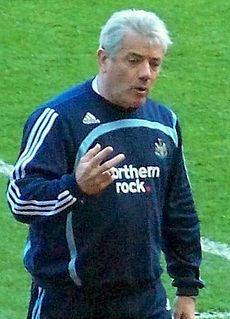
In their first year back in the top league, the 1993–94 season, Newcastle finished third. Kevin Keegan's attacking style of play led the team to be called "The Entertainers."
Keegan led Newcastle to finish second in the league in 1995–96 and 1996–97. They came very close to winning the title in 1996. The team's success was due to amazing attacking players like David Ginola, Les Ferdinand, and Alan Shearer. Shearer was signed on July 30, 1996, for a world record fee of £15 million.
Keegan left in January 1997 and was replaced by Kenny Dalglish. The club had a tough season, finishing 13th and losing the 1998 FA Cup Final. Dalglish was replaced by Ruud Gullit, but he also left after disagreements. Bobby Robson took over in 1999.
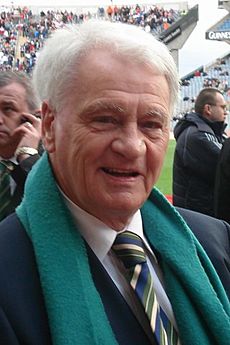
Under Bobby Robson, Newcastle challenged for the title in 2001–02, finishing fourth and qualifying for the UEFA Champions League. The next season, they finished third in the League and reached the second group stage of the Champions League. Newcastle finished fifth in 2003–04, but Robson was let go in August 2004.
Graeme Souness became manager in 2004–05. He signed Michael Owen for a club record £16.8 million. Souness was sacked in February 2006 after a poor start to the 2005–06 season. Glenn Roeder took over. Alan Shearer retired at the end of the 2005–06 season as the club's all-time top goal scorer with 206 goals.
In 2006, Newcastle won the UEFA Intertoto Cup for the first time. Roeder left in May 2007, and Sam Allardyce was appointed manager.
The Mike Ashley Years (2007–2021)
On June 7, 2007, businessman Mike Ashley bought the club. He later announced he would take the club off the stock exchange.
Allardyce left in January 2008, and Kevin Keegan returned as manager. However, Keegan resigned in September 2008, saying he didn't have enough control over player choices. Joe Kinnear took over, but due to heart surgery, Alan Shearer became interim manager in February 2009. Under Shearer, the club was moved down to the EFL Championship at the end of the 2008–09 season. This was the first time they had left the Premier League since 1993.
The club was put up for sale in June 2009. Chris Hughton became manager, first temporarily, then full-time. Ashley later announced the club was no longer for sale.
Hughton led Newcastle to win the 2009–10 Football League Championship, securing promotion back to the Premier League in April 2010 after just one season away.
Hughton was sacked in December 2010, and Alan Pardew was appointed manager. Newcastle finished 12th that season. The 2011–12 season was very successful, with Newcastle going 11 games unbeaten. They finished fifth, qualifying for the 2012–13 UEFA Europa League. Pardew won both the Premier League Manager of the Season and the LMA Manager of the Year awards.
The next season was tougher due to injuries. Newcastle reached the Europa League quarter-finals but struggled in the league, narrowly avoiding being moved down.
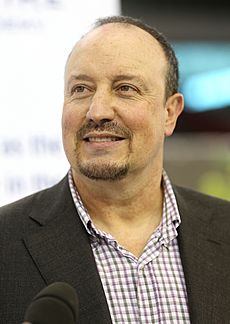
In the 2014–15 season, Newcastle had a poor start, leading to fan protests against Pardew. He left in December, and John Carver took over, but the team again came close to being moved down.
Steve McClaren replaced Carver in June 2015. He was sacked in March 2016, with Newcastle in 19th place. Rafael Benítez took over but could not prevent the club from being moved down for the second time under Ashley's ownership.
Newcastle returned to the Premier League immediately, winning the Championship title in May 2017. Mike Ashley put the club up for sale again in October. The team finished 10th in the league, their highest finish in four years. The next season, they finished 13th. Benítez left in June 2019 after not agreeing to a new contract.
Steve Bruce was appointed manager in July 2019. He led the team to 13th and 12th-place finishes in his two full seasons.
New Ownership Era (2021–Present)
On October 7, 2021, after 14 years, Mike Ashley sold the club to a new group for £305 million. This group included Saudi Arabia's Public Investment Fund. On October 20, Bruce left his role. Eddie Howe was appointed as the new manager on November 8, 2021. Howe guided the club to an 11th-place finish, making Newcastle the first Premier League team to avoid being moved down after not winning any of their first 14 games.
On August 21, 2022, Newcastle United Women became part of the club's ownership. At the end of the 2022–23 season, the club qualified for the Champions League for the first time in 20 years. The 2023–24 season saw Newcastle exit the Champions League in the group stages.
On March 16, 2025, Newcastle United won their first major domestic trophy since 1955. They beat Liverpool 2–1 in the 2025 EFL Cup final with goals from Dan Burn and Alexander Isak.
Club Identity: Colours and Crest
|
|
| Newcastle United's original colours, worn until 1894 |
Newcastle United's home kit is a black and white striped shirt. The shorts and socks are usually black with white details, though white socks are sometimes worn. When the club first started, they wore plain red shirts with white shorts and red socks, which were the colours of Newcastle East End.
In 1894, the club switched to the black and white striped shirts. These colours were chosen because they weren't linked to either of the two teams that merged to form Newcastle United. They wore grey shorts until 1897, then blue shorts until 1921, before finally adopting the black shorts they use today.
The away kit colours have changed many times over the years. They have worn white, yellow, and all-red kits in the past. Since 1995, the away kit changes almost every season.
The current club crest was first used in the 1988–89 season. It includes parts from the coat of arms of the city of Newcastle upon Tyne. The two sea horses represent the city's strong connection to the sea, and the castle represents the city's historic keep.
The city's coat of arms was first sewn onto the team's shirts in 1969 and used until 1976. From 1976 to 1983, the club used a special circular badge. This badge showed the club's full name, a magpie in front of the River Tyne, and the Newcastle keep in the background. A simpler design followed in 1983, with the initials NUFC and a small magpie. This logo was used until 1988.
Kit Suppliers and Sponsors
Newcastle United has had various companies make their kits and sponsor their shirts over the years.
In May 2013, Newcastle announced a sponsorship with Wonga.com, which caused some discussion among fans. In July 2013, it was reported that player Papiss Cissé, who is Muslim, did not want to wear the Wonga.com logo because of his religious beliefs. The issue was later resolved.
On May 15, 2017, the home shirt for the 2017–18 season was shown, featuring the logo of new sponsors Fun88. This shirt also had a special gold and silver badge to celebrate the club's 125th football season.
Newcastle United's current main shirt sponsor is Sela, a deal that began in 2023. Their kit manufacturer is Adidas, starting in 2024. The current sleeve sponsor is Noon, which started in 2022.
| Period | Kit manufacturer | Shirt sponsor (front) | Shirt sponsor (sleeve) | Shirt sponsor (back) |
|---|---|---|---|---|
| 1974–1975 | Bukta | No sponsor | No sponsor | No sponsor |
| 1975–1976 | Umbro | |||
| 1976–1980 | Bukta | |||
| 1980–1986 | Umbro | Newcastle Breweries | ||
| 1986–1990 | Greenall's Beers | |||
| 1990–1993 | Newcastle Brown Ale / McEwan's Lager | |||
| 1993–1995 | Asics | |||
| 1995–1996 | Adidas | |||
| 1996–2000 | Newcastle Brown Ale | |||
| 2000–2003 | NTL | |||
| 2003–2010 | Northern Rock | |||
| 2010–2012 | Puma | |||
| 2012–2013 | Virgin Money | |||
| 2013–2017 | Wonga.com | |||
| 2017–2018 | Fun88 | MRF Tyres | ||
| 2018–2019 | No sponsor | |||
| 2019–2020 | StormGain | |||
| 2020–2021 | ICM.com | |||
| 2021–2022 | Castore | Kayak | ||
| 2022–2023 | Noon | |||
| 2023–2024 | Sela | |||
| 2024–2025 | Adidas | Sam Fender People Watching | ||
| 2025– | No sponsor |
St James' Park: Newcastle's Home Ground
St James' Park has always been Newcastle United's home stadium. It is the oldest and largest football stadium in North East England. It is also the seventh-largest football stadium in the Premier League. The stadium has hosted 11 international football matches. It was also used for the 2012 Summer Olympics and the 2015 Rugby World Cup.
Football was played at St James' Park as early as 1880. Newcastle East End took over the ground in 1892 before becoming Newcastle United. Around 1900, the stadium could hold 30,000 people. It was then rebuilt between 1900 and 1905, increasing its capacity to 60,000, making it the biggest stadium in England for a while.
For most of the 20th century, the stadium stayed much the same. In 1987, the old West Stand was replaced with the Milburn Stand. The Sir John Hall Stand replaced the Leazes End in 1993. The rest of the stadium was also updated, making it an all-seater stadium with a capacity of 37,000. Between 1998 and 2000, more seating was added to the Milburn and Sir John Hall stands, bringing the capacity to its current 52,305.
In October 2009, Mike Ashley announced plans to lease the stadium's name to earn more money. For a while, it was temporarily called sportsdirect.com @ St James' Park Stadium. In November 2011, the name was officially changed to the Sports Direct Arena. However, in October 2012, Wonga.com became the main sponsor and brought back the original name, St James' Park.
After the 2022–23 season, some seating areas were changed into "safe standing" zones. This means that for the first time since 1993, St James' Park is no longer an all-seater stadium.
In July 2023, plans were confirmed for a new fan zone outside the Gallowgate End. This will be built with Stack and Sela, the club's shirt sponsor.
Since 1982, the stadium has been served by St James Metro station on the Tyne and Wear Metro. The station is decorated in black and white, with old photos of the club's players.
The club's training ground is the Newcastle United Training Centre, located at Darsley Park in Benton. This facility opened in July 2003. After the club's new ownership in 2021, the Training Centre was greatly improved with new areas like a reception, restaurant, players' lounge, and medical facilities.
Club Ownership: Who Runs the Team?
Newcastle United started as a private company in 1895. For much of the 20th century, it was mainly owned by the McKeag, Westwood, and Seymour families.
In 1991, John Hall bought 79.2% of the club. In April 1997, he made the club a public company, meaning shares could be bought and sold on the stock exchange. John Hall and his family owned 57% of the shares, and his business partner Freddy Shepherd owned a smaller part.
In 2007, businessman Mike Ashley bought the shares from Douglas and John Hall, giving him 41% of the club. He then bought more shares, owning 93.19% by June 2007. This meant he owned enough to buy out the remaining shareholders.
After buying the club, Ashley announced three times that he planned to sell it. The first time was in September 2008, after fans protested when Kevin Keegan resigned. Ashley said, "You want me out. That is what I am now trying to do." However, he took it off the market in December 2008 because he couldn't find a buyer. He tried to sell it again in May and June 2009, but by August, it was off the market again. On October 16, 2017, Newcastle United announced that Ashley had put the club up for sale once more.
New Owners Take Over
In April 2020, it was widely reported that a group, including the Public Investment Fund, was trying to buy Newcastle United. This proposed sale led to some concerns and discussions.
In May 2020, some politicians asked the government to look closely at the deal. There were also concerns about sports broadcasting issues in the region. In July 2020, the group announced they were no longer interested in buying Newcastle, saying the process had taken too long. This decision made many Newcastle fans upset.
However, on October 7, 2021, the Public Investment Fund and its partners confirmed they had officially bought Newcastle United. This marked a new chapter for the club.
Social Responsibility: Helping the Community
The Newcastle United Foundation is a charity started by the club in summer 2008. It works to help disadvantaged children, young people, and families in the North East. The foundation encourages learning, promotes healthy living, and supports equality and diversity.
In December 2012, the club announced it had become the world's first "carbon positive" football club, meaning they do more to help the environment than they harm it.
Supporters and Rivalries: The Toon Army
Newcastle United's supporters are known for being very passionate. In 2016, fans started the Wor Flags group, which creates large and unique flag and banner displays at St James' Park. This group is fully funded by fans.
The club has its strongest support in the North East, but there are fan clubs all over the world. The club's nickname is The Magpies. Supporters are also called the Geordies or the Toon Army. "Toon" comes from the local way of saying "town."
In 2004, a survey found that Newcastle United fans traveled the furthest and spent the most money to attend every away game in the Premier League. The total distance was like traveling around the world! In the 2016–17 season, even when the team was in a lower league, the average attendance was over 51,000.
Fans publish several magazines, called fanzines, like True Faith and The Mag. They also have a website, NUFC.com, which started in 1996. Besides regular football chants, Newcastle supporters sing the traditional Tyneside song "Blaydon Races". Before each home game, the team enters the field to "Going Home", a song by Newcastle fan Mark Knopfler.
In 1998, The Police founder and Newcastle fan Sting wrote a song for the club called "Black and White Army (Bringing The Pride Back Home)." In 2015, some Newcastle fans boycotted games to protest the club's management, and famous fans like Sting supported them.
Newcastle's main rivals are Sunderland. Their matches are called the Tyne–Wear derby. They also have a rivalry with Middlesbrough, known as the Tyne-Tees derby.
Records and Statistics: Club Achievements
As of the 2025–26 season, Newcastle United has spent 94 seasons in the top league. They are eighth in the all-time Premier League table and have won the ninth-highest number of major trophies among English clubs, with 11 wins.
Jimmy Lawrence holds the record for the most appearances for the club, playing 496 games between 1904 and 1921. The club's top goalscorer is Alan Shearer, who scored 206 goals from 1996 to 2006. Andy Cole scored the most goals in a single season, with 41 goals in 1993–94. Shay Given has played the most international games while at the club, with 134 appearances for the Republic of Ireland.
Newcastle's biggest win in the league was 13–0 against Newport County in 1946. Their heaviest league defeat was 9–0 against Burton Wanderers in 1895.
The record home attendance for Newcastle was 68,386 for a match against Chelsea in 1930. The highest attendance in the Premier League was 52,389, against Manchester City in 2012. The most money received for a Newcastle player was £35 million for Andy Carroll in 2011 and for Elliot Anderson in 2024. The most the club has spent on a player is £63 million for Alexander Isak in August 2022.
Players: The Team Today
First-team squad
|
|
Other players under contract
The following players have previously been in the first team squad:
|
Under–21s and Academy
The following Under-21 players have previously been named in a Newcastle United squad for a competitive match:
|
|
Player of the Year Awards
- Source: Newcastle United F.C.
|
|
|
|
Management and Leadership
Backroom Staff
| Position | Staff |
|---|---|
| Sporting Director | Vacant |
| Manager | Eddie Howe |
| Assistant manager | Jason Tindall |
| First-team coach | Stephen Purches |
| First-team coach | Simon Weatherstone |
| First-team coach | Graeme Jones |
| Head of goalkeeping | Adam Bartlett |
| Goalkeeping coach | Shwan Jalal |
| Goalkeeping performance analyst | Daniel García |
| Set-Piece coach | Martin Mark |
| Performance Director | James Bunce |
| Head of medicine | Paul Catterson |
| Head physiotherapist | Sean Beech |
| Senior physiotherapist | Nathan Ring |
| Physiotherapist | Aaron Harris |
| Physiotherapist | Daniel Martí |
| Head of rehabilitation | Sean Beech |
| Head of strength & conditioning | Nick Grantham |
| Strength & conditioning coach | James Allan |
| Head of performance analysis | Tom Coffield |
| Performance analyst | Kieran Taylor |
| Head of performance | Dan Hodges |
| Lead sports scientist | Liam Mason |
Source:
Board of Directors
| Position | Staff |
|---|---|
| Chairman | Yasir Al-Rumayyan |
| Chief Executive Officer | Darren Eales |
| Chief Financial Officer | Simon Capper |
| Chief Commercial Officer | Peter Silverstone |
| Chief Operating Officer | Brad Miller |
| Director | Jamie Reuben |
| Director | Abdulmajid Ahmed Alhagbani |
| Director | Asmaa Mohammed Rezeeq |
| Director | Jacobo Solis |
| Director | Roger Thornton |
| Global ambassador | Alan Shearer |
Source:
Honours: Trophies Won
- Source:
League Titles
- First Division / Premier League (top league)
- Champions: 1904–05, 1906–07, 1908–09, 1926–27
- Second Place: 1995–96, 1996–97
- Second Division / First Division / Championship (second league)
- Champions: 1964–65, 1992–93, 2009–10, 2016–17
- Second Place: 1897–98, 1947–48
Cup Competitions
- FA Cup
- Winners: 1909–10, 1923–24, 1931–32, 1950–51, 1951–52, 1954–55
- Runners-up: 1904–05, 1905–06, 1907–08, 1910–11, 1973–74, 1997–98, 1998–99
- Football League Cup / EFL Cup
- Winners: 2024–25
- Runners-up: 1975–76, 2022–23
- FA Charity Shield
- Winners: 1909
- Runners-up: 1932, 1951, 1952, 1955, 1996
- Inter-Cities Fairs Cup
- Winners: 1968–69
Other Titles
- Sheriff of London Charity Shield
- Winners: 1907
- Texaco Cup
- Winners: 1973–74, 1974–75
- UEFA Intertoto Cup
- Winners: 2006
- Anglo-Italian Cup
- Winners: 1973
See also
 In Spanish: Newcastle United Football Club para niños
In Spanish: Newcastle United Football Club para niños


